The training of the Speech Therapist in Europe
Camilla Verdilio, Alice Di Battista, Carolina Ausili Cefaro
The figure of the Speech Therapist is not uniformly defined in each state of the European geographical area. For this reason, every country deals with the basic, the post-basic and the continuous training autonomously for what concerns the training length, contents and procedures. Thanks to the analysis of data from 32 countries in the European geographical area, this study accurately determined how the current basic, post-basic and continuous training of Speech Therapists are handled in the states of the European geographical area and identify which are the prevalent procedures. In Europe forty-two possible pathways to becoming a speech therapist were identified, the duration of which ranges from four years in 44% of countries, three years in 31% and five years in 25%, with a Bachelor’s degree as a required title in 69% of the cases. In the majority of the nations access to the study program is limited, the apprenticeship is compulsory at the basic training level and there is no State Exam. Data on the post-basic training at the master’s degree and doctorate (Ph.D.) level, and on continuous training proved to be more challenging to find. Such a diverse picture reflects a newly emerging and fast-growing profession. This study delineates the similarities and the differences among all the countries with the intention of establishing a practical support for the process initiated by ESLA, which has the objective of systematizing the standards of professionalizing academic courses at a European level.
Keywords
Europe, Speech Therapy, Basic training, Post-basic training, CME.

